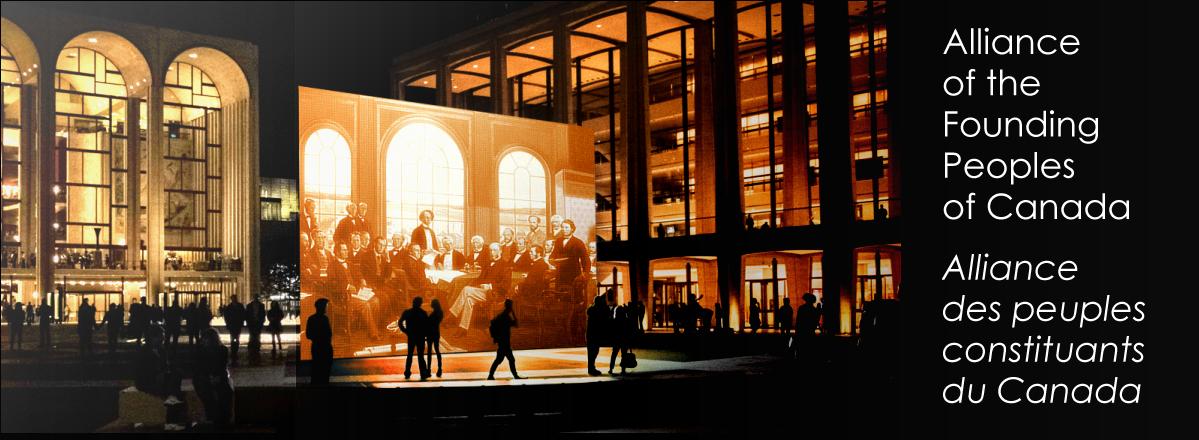THE CANADA WANTED BY JOHN A. MACDONALD
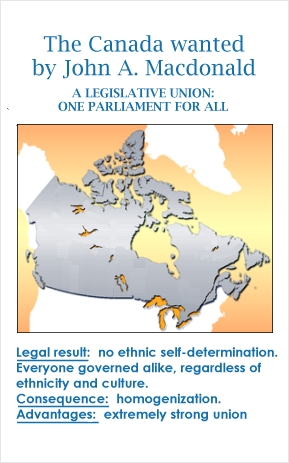
The Canada wanted by John A. Macdonald
Today, you will learn that the Federal structure of Canada has enforceable legal meaning.
On the left, no internal borders. Below, internal provincial borders. The difference is in the type of Constitution adopted in 1867, and its legal effects which protect the founders of the country from extinction.
The British North America Act of 1867 is the true “Charter of Rights” of the Founding Peoples of Canada.
The BNA Act establishes our rights through words with legal impetus, and through a federal structure with legal implications. The structure created by the Constitution has legal meaning. Canadian legal federalism is the structural entrenchment of the true rights of the founders of Canada.
The British North America Act, through the Federal structure, confirms our permanent entitlement to self-government.
Self-government is the opposite of shared government. Shared government would be all ethnicities mixed together in a pool and having one legislature where their elected members battle out the laws to be passed. Technical name: LEGISLATIVE UNION. In other words, all peoples united in making the same laws or legislation to govern all.
THE CANADA WANTED BY THE PEOPLE
A situation like this existed just before Confederation. It was so damaging to the Britanno and French-Canadian ethnicities who were at each other’s throats that even if Confederation of the whole of Canada had not been done, the old Province of Canada (Upper and Lower Canada — Ontario and Quebec today) would have been federalized (divided in two) to solve the problem of ethnic political warfare. Each half would then have made its own laws for its own ethnic majority.
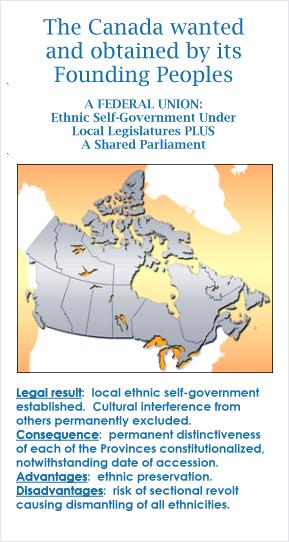
The Canada Wanted And Obtained By Its Founding Peoples
Self-government means that each founding people, each constituent people of Canada — a majority on its own soil in 1867 — obtained through federalism (federal structure) the constitutional guarantee of permanent self-rule through its own legislature. So when you look at the map of Canada and you see that it has numerous internal borders, that means that each majority ethnicity at Confederation has the right to self-government within its own territory.
Why is this significant? Because it means not battling with other ethnicities, not “accommodating” other peoples, such as mass immigrated foreigners for the right to exist, for the right to control the institutions necessary to exist, for the right to pass laws beneficial to one’s own culture. It means no serious compromise of your own culture and of your own decisions on how to develop it.
Canada’s federalism being constitutionally prescribed (decreed, ordained), it also means the permanent entitlement of each majority ethnicity to its own legislature, and to all measures to maintain its local majority, including keeping out mass foreign immigrants and dissimilar immigrants who do not share, value or wish to adopt Canadian culture as the heritage of their own children.
In conclusion, the boundary lines of the Provinces are the boundaries of the provincial laws enacted by each majority ethnicity. In Canada, this prevents interference in the other founding peoples’ cultures. The structure of Confederation and also the words of the Constitution, prevent one Province’s laws from applying to another Province, i.e., to another ethnicity.
They prevent the ethnic majority in one Province from legislating for the ethnic majority of another Province, therefore constitutionally eliminating undue inter-cultural interference.
Those protective words include the conferral of legislative power at s. 92 of the British North America Act of 1867 (I’m using the original BNA as enacted by United Kingdom Parliament):
Section title: Exclusive Powers of Provincial Legislatures
Marginal header: Subjects of exclusive Provincial Legislation92. In each Province, the Legislature may exclusively make Laws in relation to Matters coming within the Classes of Subjects next herein-after enumerated …”
Take note of the word “each” and the word “exclusively“. “Each” is a reminder that there is a provincial boundary; the word “exclusively” prevents the federal level from making laws on these subjects; it prevents other provincial legislatures from making laws for your soil on these subjects.
Therefore, having protected yourself and given yourself the institutions of self-government, why would you tolerate the mass immigration of foreigners onto your own “exclusive” soil to submerge your ethnicity and demand a say in how you make laws for yourself in B.C., Alberta, Quebec, Ontario, Newfoundland, etc.?
The only immigration that can be lawfully entertained is the immigration of people who value or already share the roots from which yours are derived; and who plan to preserve them with you. Any other use of the institutions of self-government established in 1867 is unconstitutional and a fraud.
All dissimilar immigration, all mass immigration, all badgering of the founding peoples to “accommodate” unwanted foreigners is an attack on the Constitution and upon the very existence of the founding or constituent peoples of Canada.
Therefore, the grounds for stopping the mass immigration (permanent injunction), and for reversing the illegal immigration already done (paid repatriation) are that it is unconstitutional thus illegal; being a violation of self-government established by Canadian federalism in 1867.
That said, we have first of all to get rid of the 1982 coup d’état imposed by the Marxist left, and restore the proper BNA Act to full legal effect. An interim injunction stopping the mass immigration and multiculturalism would be needed. Then, when the rightful Constitution is back, paid repatriation can be used to repatriate the illegally immigrated foreigners.
In addition, appropriate law suits in damages ought to be launched against those who have carried out the 1982 coup d’état, and the illegal immigration, including seizing their assets to pay for the costs of restoring the country and re-situating the unwanted immigrants. I will write another day about “paid repatriation”.
It is therefore unconstitutional and ludicrous to mass-immigrate foreigners and then tell the Canadian founding peoples to “accommodate” them, thus destroying the self-government established by the Constitution.
Mass immigration of hundreds of foreign cultures onto Provincial soil defies these legal boundaries that protect the founders. It defies the provincial structure enacted in 1867 to guarantee the founding peoples freedom from outside cultural interference.
Mass immigration and a “policy” of multiculturalism are unconstitutional and a coup d’état on the founding peoples.
THE CONSTITUTION RULES : NOT TREATIES OR THE U.N.
Now, if someone comes along and tells you, we joined the UN and signed on to treaties and accords which impose these “values” (mass immigration, multiculturalism), it doesn’t matter what they call it, the hierarchy of LAW is and always has been:
[1] the domestic constitution rules;
[2] any form of international law inconsistent with the domestic constitution cannot be imposed on the country.
Signing treaties for it has no legal effect; signing accords for it has no legal effect; conning the provinces into issuing orders in council or statutes purporting to affirm unconstitutional international law for provincial and Canadian soil has no legal effect.
Neither the federal level nor the provinces can pass laws which violate the constitution, including the federal structure of 1867. Such purported laws are void. Nor can they adopt “policies” inconsistent with Confederation.
The Constitution of Canada rules; nothing else.
HANSARD OF 1865 PROVES THE PURPOSE
OF CANADA’S LEGAL FEDERALISM
What I’ve told you above is confirmed by the Debates on Confederation. I will use a speech of the French-Canadian Solicitor General East as the prime example. I will break this up into paragraphs for easier consumption.
SOLICITOR-GENERAL EAST, HECTOR-LOUIS LANGEVIN

Hector-Louis Langevin
The Hon. Solicitor-General Hector-Louis Langevin, speaking for the French-Canadians in Quebec on Tuesday, 21 February, in the Legislative Assembly of the old province of Canada during the 1865 Debates on Confederation, makes the meaning of Canadian legal federalism clear. “Bas-Canada” is “Lower Canada” (now called Quebec).
Page 379 in the French “Débats”.
Page 372 in the English “Debates”.
|
L’Hon. Sol.-Gen. LANGEVIN — |
Hon. Solicitor-Gen. LANGEVIN — |
|
M. l’Orateur. Ce que nous désirons et voulons, c’est défendre les intérêts généraux d’un grand pays et d’une puissante nation, par le moyen d’un pouvoir central et fort. D’un autre côté, nous ne voulons pas faire disparaître nos différentes coutumes, nos mœurs, nos lois : au contraire, c’est là précisément ce que nous désirons le plus protéger par la confédération. |
Mr. Speaker. What we desire and wish, is to defend the general interests of a great country and of a powerful nation, by means of a central power. On the other hand, we do not wish to do away with our different customs, manners and laws; on the contrary, those are precisely what we are desirous of protecting in the most complete manner by means of Confederation. |
|
Sous le nouveau système, il n’y aura pas plus raison qu’aujourd’hui de perdre notre qualité de Français ou d’Anglais, sous le prétexte que nous aurons tous les mêmes intérêts généraux, et nos intérêts de race, de religion et de nationalité resteront ce qu’ils sont aujourd’hui. Mais ils seront mieux protégés sous le système proposé, et c’est là encore une des plus fortes raisons en faveur de la confédération. |
Under the new system there will be no more reason than at present to lose our character as French or English, under the pretext that we should all have the same general interests; and our interests in relation to race, religion and nationality will remain as they are at the present time. But they will be better protected under the proposed system, and that again is one of the strongest reasons in favor of Confederation. |
|
Non seulement en effet nous nous sommes assurés de cette protection, mais les provinces parties à la confédération l’ont ainsi voulu. Tous les intérêts locaux seront soumis et laissés à la décision des législatures locales. Il y aura, pour le Bas-Canada, d’autres exceptions, et, de fait, toutes les exceptions dans le plan de confédération sont en faveur du Bas-Canada. |
Not only indeed did we assure ourselves of that protection, but the provinces who were parties to the Confederation desired it also. All local interests will be submitted and left to the decision of the local legislatures. There will be other exceptions with respect to Lower Canada, and, in fact, all the exceptions in the scheme of Confederation are in favor of Lower Canada. |
|
Ce sont les délégués Bas-Canadiens qui ont obtenu ces restrictions en faveur de cette province ; mais ils ne sollicitent pas de remerciments pour cette conduite, car ils considèrent qu’ils n’ont fait en cela que remplir un devoir : le devoir de vrais patriotes et de bons citoyens. |
These restrictions in favor of Lower Canada were obtained by the delegates from that province; but they seek no thanks for their conduct, as they consider that in so doing they only performed a duty — a duty incumbent on all true patriots and good citizens. |
|
Tout ce qu’ils viennent demander aujourd’hui à cette chambre, c’est de sanctionner la mesure qui assure ces privilèges aux populations qu’ils représentent. |
All that they now come to this House and ask for, is its sanction to the measure which ensures these privileges to the populations which they represent. |
|
J’ajouterai que, sous la confédération, toutes les questions qui concernent la colonisation de nos terres incultes, la disposition et la vente de ces mêmes terres, nos lois civiles, toutes les mesures d’une nature locale, enfin tout ce qui intéresse et affecte nos intérêts les plus chers comme peuple, seront réservés à l’action de nos législatures locales ; toutes nos institutions de charité et autres seront protégées par la même autorité. |
I may add that, under Confederation, all questions relating to the colonization of our wild lands, and the disposition and sale of those same lands, our civil laws and all measures of a local nature — in fact everything which concerns and affects those interests which are most dear to us as a people, will be reserved for the action of our local legislature : all our charitable and other institutions will be protected by the same authority. |
|
II y a aussi la question de l’éducation : sur cette question, comme sur toutes les autres, les délégués Bas-Canadiens ont veillé au maintien de certains privilèges, et cette question a été laissée à notre législature locale, en sorte que la législature fédérale ne pourra pas y porter atteinte. |
There is also the question of education. Upon this question, as upon all others, the Lower Canadian delegates have seen to the preservation of certain privileges, and that question has been left to our Local Legislature, so that the Federal legislature shall not be able to interfere with it. |
The ‘measure which ensures the privileges’ of the French Canadians is the British North America Act, 1867. It also ensures the rights of all of the founding peoples of the country. As the Hon. Langevin pointed out, “the provinces who were parties to the Confederation desired it also“. Sir John A. Macdonald confirms this in the extract from Hansard, below.
The British North America Act, 1867 is the Constitution of the Founding Peoples. It’s the Canadian “game rules”. It pays to know your game rules.
The “game rules” are legally enforceable because they are constitutionalized. They are made compulsory by enactment of them as the framework of the country.
The terms and provisions of the British North America Act, 1867 are legally enforceable by any of the founding majorities of the country. Quebec is not the only Province that sought the guarantees of a federal Constitution. All the founding provinces determined the future form of Confederation by seeking the same guarantees.
In consequence, the ethnic majority of each Province at the time of accession is the self-governing majority of that Province, and is entitled to remain so.
In British Columbia, for example, the Chinese cannot be mass-imported to displace the British-derived Founding Peoples who were the ethnic majority when British Columbia entered Confederation. It cannot be done under the lawful Constitution of 1867; and there are no words in the 1982 coup d’état constitution to authorize doing so.
The federal structure of the country, despite the coup d’état, remains unaltered. The rights of the Founding Peoples to exist unmolested thus remain unaltered.
ATTORNEY GENERAL JOHN A. MACDONALD
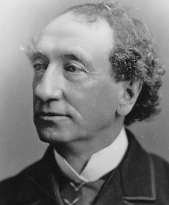
John A. Macdonald
I will give you Attorney General John A. Macdonald in the Legislative Assembly on Monday, February 6, 1865.
And please note, the game rules are right up front, they are on the table and clear when the Debates begin:
Page 30 in the French “Débats”.
Page 29 in the English “Debates”.
|
Le troisième et seul moyen d’obtenir une solution à nos difficultés était une confédération des provinces, par une union, soit fédérale, soit législative. Or, quant aux avantages comparatifs d’une union législative et d’une union fédérale, je n’ai jamais hésité à dire que si la chose était praticable, une union législative eût été préférable. [Ecoutez ! écoutez !] |
The third and only means of solution for our difficulties was the junction of the provinces either in a Federal or a Legislative Union. Now, as regards the comparative advantages of a Legislative and a Federal Union, I have never hesitated to state my own opinions. I have again and again stated in the House, that, if practicable, I thought a Legislative Union would be preferable. (Hear, hear.) |
|
J’ai déclaré maintes et maintes fois que si nous pouvions avoir un gouvernement et un parlement pour toutes les provinces, nous aurions eu le gouvernement le meilleur, le moins dispendieux, le plus vigoureux et le plus fort. [Ecoutez ! écoutez !]. Mais en considérant ce sujet et en le discutant, comme nous l’avons fait dans la conférence avec le désir d’en venir à une solution satisfaisante, j’ai trouvé que ce système était impraticable. |
I have always contended that if we could agree to have one government and one parliament, legislating for the whole of these peoples, it would be the best, the cheapest, the most vigorous, and the strongest system of government we could adopt. (Hear, hear.) But, on looking at the subject in the Conference, and discussing the matter as we did, most unreservedly, and with a desire to arrive at a satisfactory conclusion, we found that such a system was impracticable. |
|
Et, d’abord, il ne saurait rencontrer l’assentiment du peuple du Bas-Canada, qui seut que, dans la position particulière où il se trouve comme minorité, parlant un langage différent, et professant une foi différente de la majorité du peuple sous la confédération, ses institutions, ses lois, ses associations nationales, qu’il estime hautement, pourraient avoir à en souffrir. C’est pourquoi il a été compris que toute proposition qui impliquerait l’absorption de l’individualité du Bas-Canada, ne serait pas reçue avec faveur par le peuple de cette section. |
In the first place, it would not meet the assent of the people of Lower Canada [the future Province of Quebec], because they felt that in their peculiar position — being in a minority, with a different language, nationality and religion from the majority, — in case of a junction with the other provinces, their institutions and their laws might be assailed, and their ancestral associations, on which they prided themselves, attacked and prejudiced; it was found that any proposition which involved the absorption of the individuality of Lower Canada — if I may use the expression — would not be received with favor by her people. |
|
Nous avons trouvé, en outre, que quoique le peuple des provinces inférieures parle la même langue que celui du Haut-Canada et soit régit par la même loi, — loi basée sur le droit anglais, — il n’y avait, de la part de ces provinces, aucun désir de perdre leur individualité comme nation, et qu’elles partageaient à cet égard, les mêmes dispositions que le Bas-Canada. (Ecoutez ! écoutez.) |
We found too, that though their people speak the same language and enjoy the same system of law as the people of Upper Canada, a system founded on the common law of England, there was as great a disinclination on the part of the various Maritime Provinces to lose their individuality as separate political organisations, as we observed in the case of Lower Canada herself. (Hear, hear.) |
|
C’est pourquoi, après mûre considération du sujet et des avantages et désavantagea des deux systèmes, nous nous aperçûmes que l’union législative ne ralliait pas toutes les opinions, et qu’il ne nous restait qu’à adopter l’union fédérale comme seul système acceptable, même aux provinces maritimes. |
Therefore, we were forced to the conclusion that we must either abandon the idea of Union altogether, or devise a system of union in which the separate provincial organizations would be in some degree preserved. So that those who were, like myself, in favor of a Legislative Union, were obliged to modify their views and accept the project of a Federal Union as the only scheme practicable, even for the Maritime Provinces. |
Confederation was thus born as an ethnic federation, its purpose to preserve each and every one of the founding peoples and their cultures.
Confederation therefore excludes any law, policy or measure inconsistent with that purpose. These would be void as ultra vires and unconstitutional.
This fact is underscored by the Long Title of the British North America Act, similar in function to the famed “supremacy clause” of the United States Constitution. In the case of Canada, the Long Title is a particular formulation of the doctrine of ultra vires. Ultra vires means outside of power, beyond power, or no power to act in a certain way.
Being the title of the whole Constitution, the Long Title limits all government action, both federal and provincial; and indeed municipal, should anyone attempt to foist provincial or federal powers upon a multicultural internal “city-state” for example. Confederation does not create multicultural city-states, which, if these come to exist, would wipe out the rights of the Founding Peoples to self-government under our Parliament and Legislatures.
Canada’s Long Title reads as follows:
An Act for the Union of Canada, Nova Scotia, and New Brunswick, and the Government thereof; and for Purposes connected therewith.
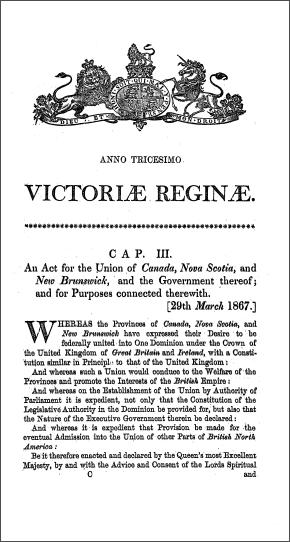
The Long Title of the British North America Act, 1867
The Long Title tells you what the Constitution is for. It’s for “the Union” and “Purposes connected” with that Union. The Long Title therefore automatically excludes disunion, multiculturalism (a different union for other people), annexation, and any other act or policy inconsistent with the rights of the Founding Peoples of 1867, as of all later accession dates. You can see that the legal entitlements created by the federal structure of the country are underscored by the Long Title. And those entitlements benefit the Founding Peoples.
Multiculturalism and the mass immigration required to do it are obviously inconsistent with Confederation, given the Long Title. They are illegal and cannot be done because they are not “connected” with the “Purposes” of “the Union” of 1867, or its development by the accession of other provinces.
Moreover, multiculturalism is not simply a “policy”, as the Liberals called it under Trudeau; it is a different constitution than Confederation, for a different population being imported to replace the Founding Peoples.
LEGAL FEDERALISM HAS ENFORCEABLE MEANING
If your rights are in the Constitution, you can enforce them. It should now be clear that the federal structure of Canada has both political and legal meaning. The point of federalism in Canada is the self-preservation and self-determination of the Founding Peoples. The Provinces may not be turned into miniature global federations of the whole world’s demographics; that is not Confederation. It is the opposite of self-preservation and the denial of self-government.
The implications of the federal structure can no more be ignored by governments than the words used in the text of the constitution which create and establish our institutions. Or the words of the Long Title, which limit the use of all constitutional power to the Purpose of 1867.
The Crown, the Executive, the Privy Council, the Federal Parliament, the Provincial Legislatures, the territorial governments, the national and unitary system of our Courts, etc. all are fundamental rights of the founding peoples of Canada. They belong to no one else. They reflect our unique cultural and sociological heritage, which may not, legally speaking, be compromised by inconsistent action.
A last word on Quebec. Attorney-General John A. Macdonald noted that Lower Canada (Quebec) “being in a minority, with a different language, nationality and religion from the majority” … would not accept a legislative union. That’s map #1 to the left on top: no internal borders.
However, pay close attention: the purpose of Confederation was to convert each “minority” political identity to a majority under its own legislature, where it could not be out-voted by anyone else.
After the 1st of July, 1867, it is no longer possible, in legal terms, to speak of the French Canadians in Quebec, or of the founding ethnic majorities of any of the provinces as “minorities”. Confederation was done to stop them being minorities; and prevent each one from being absorbed by any or all of the others.
Mass-importing foreigners to now absorb them on their own soil is a blatant perversion of the Purpose of 1867.
No government can simply decide one day to impose a new constitution by means of a “policy”, and erase Confederation. But this is what they have done for decades. By trickery, by double-talk, but mostly because they know very well that the people to whom Canada belongs don’t know the “game rules”.
Anyone accustomed to the 1982 “Charter” (which is illegal and a coup d’état) is prone to think that “rights” are only such things as free speech, free association, legal representation, etc. However, self-government is the first and basic “right”. And it is legally enforceable because of the structure and terms of the lawful Constitution.
“Anything Goes … Because So Few Know …”

Peter H. Russell
While it existed, Praxis was incorporated as a non-profit “charity” enabling it to receive donations and government grants. It received such grants under prime minister Pierre Elliott Trudeau. Indeed, the backbone of the Praxis budget (circa 1970) was a $68,000.00 grant from the Central Mortgage and Housing Corporation, in Ottawa. One can see why Mr. Russell hurried to give “official” recognition to Pierre’s “patriation coup”. Time had come to repay the “quid” with the “pro quo”.
Mr. Russell is very well informed about the “game rules”. He also knows that Canadians aren’t informed at all.
In a surprisingly candid reflection in his article “Constitutional Reform of the Canadian Judiciary” in the Alberta Law Review of 1969 (7 Alta. L. Rev. 103 (1969), Professor Peter Russell declares the very obvious basis on which the 1982 coup d’état was pulled off (including with his own collaboration). Said Russell:
“The opening phrase of the American Constitution, “We the people of the United States, in Order to form a more perfect Union …” provides the main clue to the basic difference between the status and role of the written constitution in our two countries. Granted there is an element of political mythology in those initial words of the U.S. Constitution, but still it is a mythology with very real roots in the American political culture. For certainly the United States’ Constitution is much more a product and a possession of the popular political conscience of that country than is the B.N.A. Act, with its colonial origins and Imperial trappings, of ours. In practical terms this means that in Canada there is an insufficient common understanding — at the political level — of the content and purpose of the important provisions of the Constitution, with the result that almost anything goes because few people know.” [Emphases added.]
Those “few” include the Communists, like Peter H. Russell.
In other words, in Canada, those who claim to be running our governments are getting away with murder. Including the planned genocide of the founding peoples by mass immigration.
Last I looked, Peter Russell was still around and kicking. Like the academic mercenary that he was and is, Russell has been cranking out sheaves of academic fraud, urging the final dismantling of Canada with the phony “unwritten principles” of the 1998 Supreme Court “secession” opinion. However, as Russell ought to know, being so close an expert on Tito’s Yugoslavia, they are not “unwritten” principles at all. They are the Badinter Applicable Standards used to recognize the parts of the former Yugoslavia after it was force-dismantled by the international community. Its parts were then annexed into the European regional union, just as Canada’s parts are intended to be annexed into the North American Union.
GET TO KNOW YOUR CONSTITUTION!
LEARN YOUR “GAME RULES”.
(And you won’t have to put up with Chinese mass immigrants raising the Communist flag of Red China in Vancouver, which has been done, by the way.)
REFERENCES
THE DEBATES ON CONFEDERATION:
In French:
Débats parlementaires sur la question de la Confédération des provinces de L’Amérique britannique du Nord. 3e session, 8e Parlement Provincial du Canada, Imprimés par ordre de la Législature. Québec. Hunter, Rose et Lemieux, Imprimeurs parlementaires. 1865
In English:
Parliamentary Debates on the Subject of the Confederation of the British North American Provinces, 3rd Session, 8th Provncial Parliament of Canada, Printed by Order of the Legislature. Quebec: Hunter, Rose & Co., Parliamentary Printers, 1865.
THE 1982 COUP D’ETAT:
Patriation and Legitimacy of the Canadian Constitution by Barry Lee Strayer (1982)
The British North America Act of 1867
The TRUE Charter of Rights of the Founding Peoples:
United Kingdom Statute Law Database:
British North America Act 1867. 1867 c. 3 (Regnal. 30_and_31_Vict)
